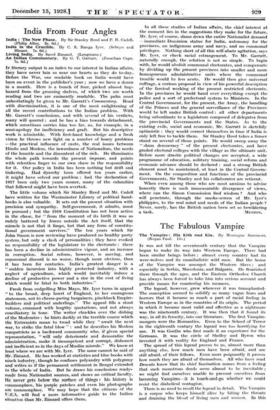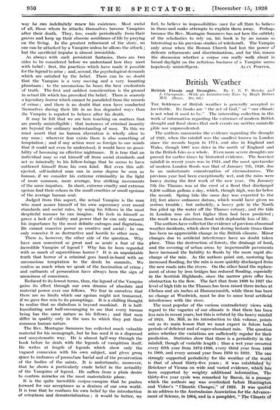The Fabulous Vampire
The Vampire : His Kith and Kin. By Montague Summers. (Kegan Paul. 153.)
IT was not till the seventeenth century that the Vampire began to make its way into Western Europe. There had been similar beings before : almost every country had its were-wolves and its cannibalistic wild men. But the home of the Vampire was amongst the Western Slays ; and especially in Serbia, Macedonia, and Bulgaria. He flourished there through the ages, and the Eastern Orthodox Church has always been forced to take him into serious account and provide means for countering his menaces.
The legend, however, grew wherever it was transplanted- The conception seemed to solidify so many vague fears and horrors that it became as much a part of racial feeling in Western Europe as in the countries of its origin. The period in which it became most valid and effective as a nightmare was the nineteenth century. It was then that it found its way, in all its ferocity, into our literature. The first Vampire- mongers were the Romantics. Even to the School of Terror in the eighteenth century the legend was too horrifying for use. It was Goethe who first made it an experience for the Germans. It was the circle of Shelley and Byron who invested it with reality for England and France.
The spread of this legend proves to us, almost more than anything else, how much men have been afraid, and are still afraid, of their fellows. Even more poignantly it proves how much they are afraid of themselves. All who have read Dracula know that its chief fascination comes from a feeling that such monstrous deeds seem almost to be inevitable ; we might find ourselves unable to prevent ourselves from becoming Vampires—it is touch-and-go whether we could resist the diabolical contagion.
There is no need to recall the legend in detail. The Vampire is a corpse who keeps himself alive by biting the throats and draining the blood of living men and women. In this way he can indefinitely renew his existence. Most awful of all, those whom he attacks themselves become Vampires after their death. They, too, exude periodically from their graves and keep up their obscene semblance of life by preying on the living. In the greatest refinement of the story, no one can be attacked by a Vampire unless he allows the attack ; but the sacrificial impulse is almost irresistible.
As alWays with such persistent fantasies, there are two sides to be considered before we understand how they meet with belief : first, the practices which have made it possible for the legend to arise ; and, second, the psychological demands which are satisfied by the belief. There can be no doubt that the Vampire is a very moving and a very haunting phantasm ; to the unconscious he bears the best credentials of truth. The first and saddest consideration is the ground in actual life which has provoked the belief. There is scarcely a legendary horror which cannot be paralleled from the records of crime ; and there is no doubt that men have conducted themselves during their life in no less degraded ways than the Vampire is reputed to behave after his death.
It may be felt that we are here touching on matters that are purely unintelligible ; that instances of criminal insanity are beyond the ordinary understanding of men. To this we must assert that no human aberration is wholly alien to any man ; wherever fear exists there is also something of temptation ; and if any action were so foreign to our minds that it could not even be understood, it would have no possi- bility of becoming an effective nightmare. It is true that an individual may so cut himself off from social standards and act so inimically to his fellow-beings that he seems to have outlawed himself from his own kind. But even this self- ejected, self-isolated man can in some degree be seen as human, if we consider his extreme criminality in the light of more common, more average, less striking movements of the same impulses. In short, extreme cruelty and extreme egoism find their echoes in the small cruelties or small egoisms of the average human soul.
Judged from this aspect, the actual Vampire is the man who must assure himself of his own supremacy over moral standards and social rules, by using his fellows in the most despiteful manner he can imagine. He feels in himself so grave a lack of vitality and power that he can only reassert his importance by the most definite outrages and flagrations. He cannot conceive power as creative and social ; he can only conceive it as destructive and hostile to other men.
There is, however, the other side of the question. Why have men conceived so great and so acute a fear of the
incredible Vampire of legend ? Why has he been regarded
with so much of superstitious horror ? It is an unpalatable truth that horror of a criminal goes hand-in-hand with an
unconscious temptation to the deeds he commits. We confess as much when we speak of the fascination of crime ; and outbursts of persecution have always been the sign of uneasiness of conscience.
Reduced to its lowest terms, then, the legend of the Vampire gains its effect through our own dreams of absolute and
material power over our fellows. We fear in ourselves that there are no limits which our egoism might not transcend, if we gave free rein to its prompting's. It is a chilling thought
to realize that no diabolism is beyond mankind. It is half- humiliating and half-encouraging to see that every human being has the same nature as his fellows ; and that men differ in quality only in the uses to which they put their common human nature.
The Rev. Montague Summers has collected much valuable material for his monograph, but he has used it in a dispersed
and unsystematic way. He is almost 411-way through the book before he deals with the legends of vampirism itself. He writes at length of legends which show only the
vaguest connexion with his own subject, and gives great - space to instances of premature burial and of the preservation of the bodies of the saints. It is unfortunate, Moreover,-
that he shows a particularly crude belief in the actuality of the Vampires of legend. He suffers from a plain desire to confirm miracles on the most materialistic plane.
It is the quite incredible corpse-vampire that he pushes forward for our acceptance as a denizen of our own world.
It is true that he confuses his own belief by the introduction of ectoplasm and dematerialization ; it would be better, we feel,- to believe in impossibilities -once for ,all than to -believe in them-and- make attempts to explain them away. Perhaps because the Rev. Montague Summers has not-here the subtlety of the ichOlasties to -rely on, his book is 'by ISO means SO interesting as his previous studies of witchcraft. The Vampire only arose' when the Roman Church had lost, the power- of delicate refinenients-and discriminations, and for this'reason -the discusSion whether a corpse can really. walk about in broad daylight on the nefarious businesS of a VaniPire: seems
. . _ •









































 Previous page
Previous page